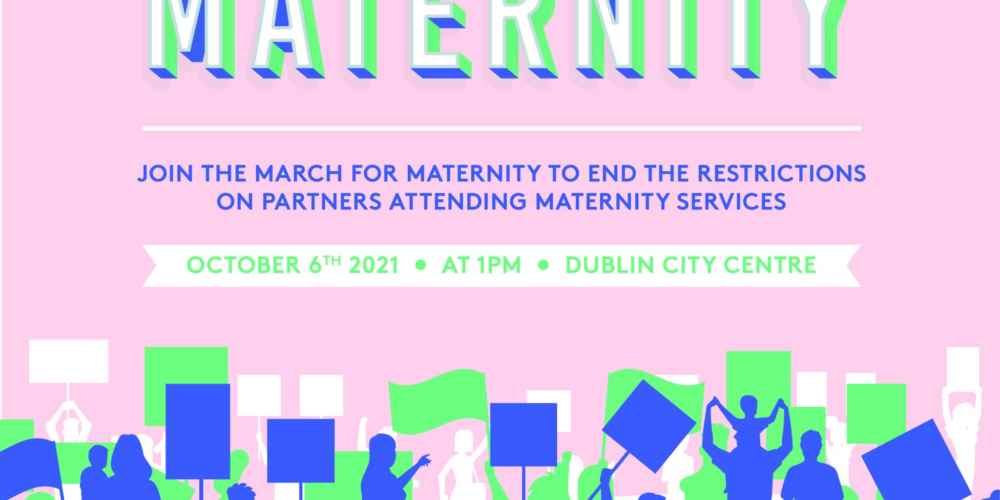On the 6th of October, at 1 p.m., the #BetterMaternityCare Campaign will be assembling outside Leinster House with the aim of ending the restrictions on birth partners’ access in maternity hospitals.
While this campaign and associated groups, such as AIMS, have been raising awareness about the impact of covid-19 restrictions on maternity care since the beginning of the pandemic, it has been the showing of the latest season of the RTE documentary series The Rotunda that really brought the discussion into the mainstream.
At a time when there were strict restrictions in maternity wards around the country, an RTE documentary crew was granted access to the Rotunda Hospital in Dublin. The broadcasting of this documentary resulted in an outpouring of ire as women took to Twitter to share their stories of isolation in pregnancy. While many would have agreed with the restrictions at the time, their sacrifices, and indeed those of their families, have since been made a mockery of, with one rule applying to patients and another to film crews.
The filming of The Rotunda is not the real problem, but it shouldn’t be the focal point of this discussion. Providing compassionate care to patients is always the goal of any member of the staff in a hospital, but the financial incentive behind the filming of The Rotunda cannot be overlooked. The Rotunda Hospital is publicly subsidised, and as a result has been underfunded through the austerity years. It has a current equipment need that exceeds €1 million. The list of requirements includes such equipment as blood-pressure monitors, infusion pumps, colposcopy couches, and a training mannequin for obstetrics, gynaecology, and midwifery.
Even now, as pubs, restaurants, public transport and sports venues all reopen to the public with few if any restrictions, pregnant people, predominantly women, continue to be left to attend hospital visits, blood tests, most ultrasound tests and the majority of labour alone. The birth partners who would normally accompany them are left waiting in car parks.
For many of the pregnant people affected by these restrictions, these appointments will be a routine, if lonely, affair. For the appointments where difficult or even devastating news is given, women are left to handle it alone, and then pass on this news themselves to their partners and families. They are also expected to labour alone, with birth partners invited in only during the last stages of labour. This can mean hours in a maternity ward with no support or familiar face to bring comfort.
Your birth partner should be allowed a daily visit of at least 30 minutes while you are in hospital. But this will depend on the hospital and if it is safe to do so.
From the HSE web site
Birth partners are often the partners of the person giving birth, a future parent of the child being born, but can also be a family member, friend, or birth doula. They are not visitors but essential support. According to the World Health Organisation, labour companionship is an essential component of providing respectful maternity care. It is part of the WHO’s recommendations on intrapartum care for positive childbirth experience and included as one of the WHO standards for improving the quality of maternal and newborn care in health facilities.
51 studies from 22 countries have revealed that labour companions play a number of roles in supporting women. They provide informational support about the process of childbirth and bridge communication gaps between clinical staff and women. They help women feel in control and build their confidence through praise and reassurance. Their continuous physical presence allows for practical and emotional support and non- pharmacological pain relief, such as massage and meditation.
Companions, importantly, act as advocates for the women. They speak up in support of their preferences when these women can’t. Women are often at their most vulnerable during childbirth, and historically in Ireland their contribution during the birthing process was often ignored and their consent assumed rather than sought for procedures they were not informed about.
The role of advocate is even more important for women from ethnic or other minority backgrounds, as these women are statistically more likely to have their pain ignored and health concerns brushed aside and to die as a result of childbirth.
This article is meant as no slight to the staff of maternity wards, who are overburdened and underpaid for the important work they do. These issues are a result of a misogynistic capitalist society that pits public health and the care of patients against cost and convenience. Such an attitude can only lead to a diseased health service; and the only treatment is a fully funded free health service, where the health and well-being of patients need be the only priority.






